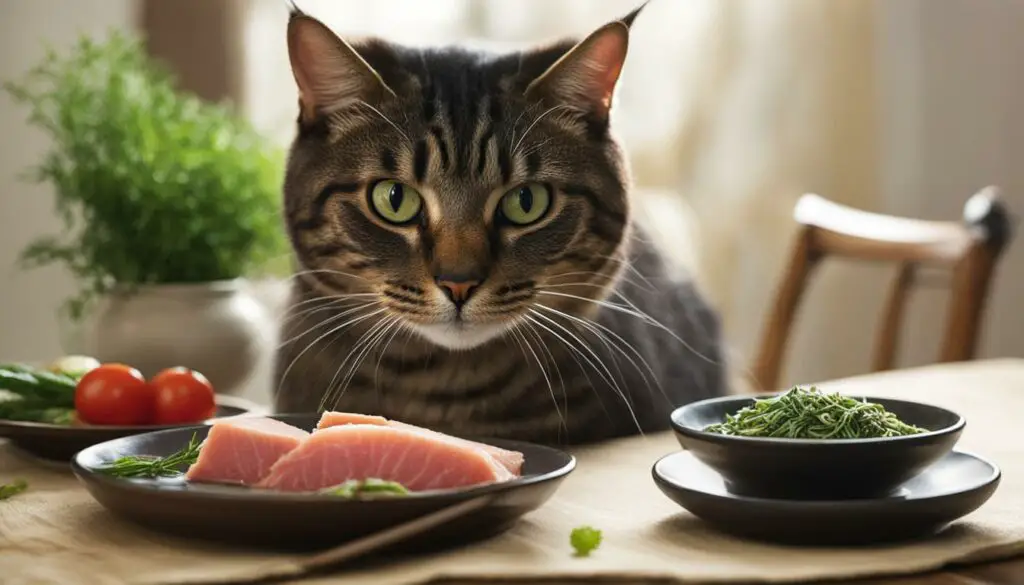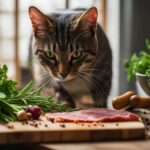Giving our beloved feline companions the best care is a top priority for cat owners like me. And when it comes to their diet, we often wonder if certain human foods are safe for our furry friends. One popular question that often comes up is, “Can I feed my cat tuna everyday?”
Tuna, a staple in many households, may seem like a tempting option for daily cat meals. But is it really a good idea? Let’s dive into the details and find out.
Feeding cats tuna, whether it’s specifically packed for cats or for humans, on a regular basis can have potential drawbacks. While cats may enjoy the taste and texture, a steady diet of tuna can lead to malnutrition as it lacks the necessary nutrients for their overall health. Additionally, consuming too much tuna can result in mercury poisoning, which can be harmful to our feline friends.
Key Takeaways:
- Feeding cats tuna everyday can lead to malnutrition and lack of essential nutrients.
- Consuming too much tuna can result in mercury poisoning in cats.
- It is best to limit tuna consumption and ensure it is only given as an occasional treat.
- Consulting with a veterinarian is crucial to determine the best diet plan for your cat.
- Explore healthy cat food options to provide a balanced and nutritious diet for your cat.
The Risks of Feeding Cats Tuna
Feeding cats tuna as a regular meal can pose several risks. While cats may find it irresistible, it’s important to understand that tuna alone does not provide a balanced diet for our feline friends. Tuna lacks essential nutrients that cats need to thrive, and relying heavily on it as a primary food source can lead to weight gain and nutritional deficiencies. It’s crucial to ensure that cats receive a varied diet that meets their specific dietary requirements.
One of the major concerns with feeding cats tuna is the high levels of mercury found in this fish. Mercury is a toxic metal that can accumulate in a cat’s body over time, leading to various health issues. Consuming too much tuna can put cats at risk of mercury poisoning, which can cause neurological problems, kidney damage, and other serious health complications.
To protect our cats from the potential risks of feeding them too much tuna, it is recommended to limit their consumption and offer it only as an occasional treat. When choosing cat food, it’s best to opt for products that are specifically formulated to meet their nutritional needs, ensuring they receive a balanced and complete diet.
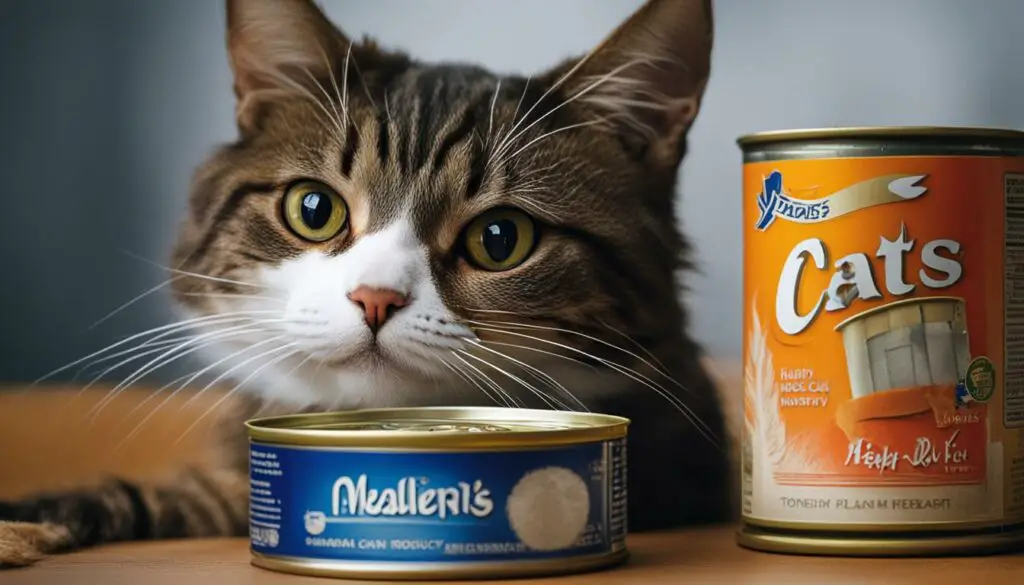
The Risks of Feeding Cats Tuna
| Risks | Implications |
|---|---|
| Malnutrition | Tuna lacks essential nutrients and can lead to weight gain and nutritional deficiencies if fed as the main diet. |
| Mercury Poisoning | The high levels of mercury in tuna can be toxic to cats and cause neurological problems, kidney damage, and other health complications. |
| Dietary Imbalance | Feeding cats only tuna deprives them of a varied diet that meets their specific nutritional needs. |
By being mindful of the risks associated with feeding cats tuna, we can ensure that our feline companions enjoy a healthy and well-rounded diet that promotes their overall well-being.
The Best Diet for Cats
When it comes to ensuring the health and well-being of our feline friends, proper nutrition plays a crucial role. Cats have specific dietary needs that must be met to support their overall health and longevity. A balanced cat diet consists of animal-based protein, essential fatty acids, vitamins, minerals, and other nutrients that fulfill their unique nutritional requirements.
Protein: Cats are obligate carnivores, meaning they require a diet high in animal-based protein. This is crucial for their muscle development, energy, and overall vitality. Look for cat food that lists meat or fish as the primary ingredient to meet their protein needs.
Essential Nutrients: Cats also require specific vitamins, minerals, and fatty acids to maintain optimal health. Omega-3 fatty acids, such as those found in fish oil, promote a healthy coat and support brain function. Vitamin A, taurine, and calcium are also essential for various bodily functions.
Healthy Cat Food Options: It is recommended to consult with a veterinarian to determine the best diet plan for your cat. They can provide guidance on selecting high-quality cat food brands that meet your cat’s nutritional needs. Look for cat food that is labeled as “complete and balanced” and formulated specifically for cats. Avoid feeding your cat dog food or homemade diets, as these may not provide the necessary nutrients in the correct proportions.
Table: Comparison of Cat Food Options
| Food Type | Advantages | Disadvantages |
|---|---|---|
| Dry Cat Food | – Convenient and easy to store – Helps maintain dental health – Available in a wide variety |
– Lower water content, leading to potential dehydration – Some brands may contain fillers and artificial additives |
| Wet Cat Food | – High moisture content, aiding in hydration – Offers variety in flavors and textures – Easier to eat for cats with dental issues |
– Requires refrigeration after opening – Can be more expensive than dry cat food |
| Raw Cat Food | – Mimics a natural, prey-based diet – May be easier for some cats to digest – Can improve coat condition and energy levels |
– Requires careful preparation to ensure nutritional balance – May carry a risk of bacterial contamination |
Remember, a cat’s nutritional needs may change throughout their life stages, so periodic reassessment of their diet is important. Avoid overfeeding and monitor your cat’s weight to prevent obesity-related health issues. Additionally, always provide fresh water for your cat to stay hydrated.
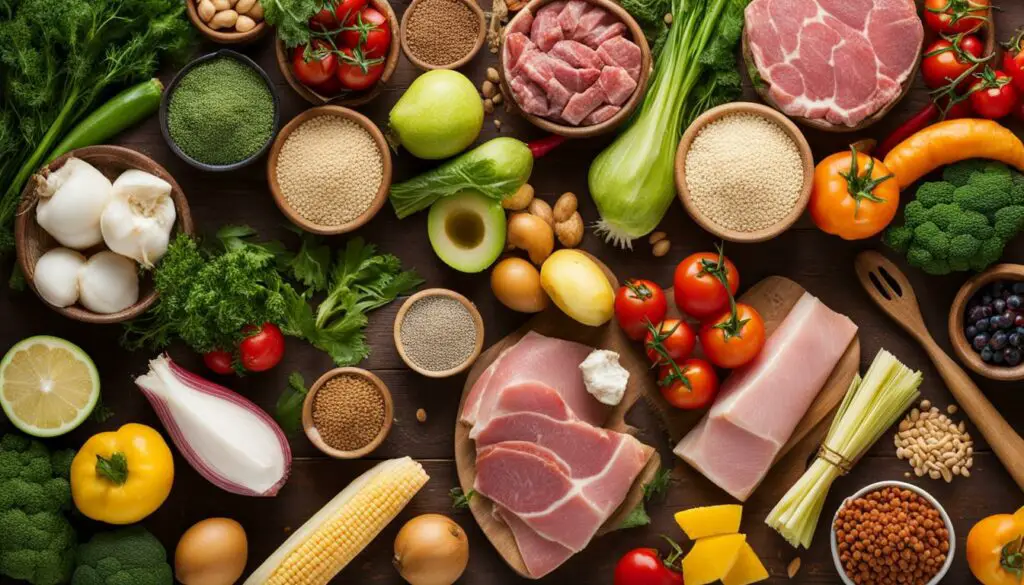
The Dangers of Onions, Garlic, and Chives
When it comes to feeding cats, it’s essential to be aware of foods that can be toxic to them. Onions, garlic, and chives are among the most dangerous ingredients that should never be included in a cat’s diet. These common household items may seem harmless to us, but they can have severe consequences for our feline friends.
Onions and garlic contain compounds that can cause damage to a cat’s red blood cells, leading to a condition called onion poisoning. This condition can result in anemia, which can cause symptoms such as weakness, lethargy, pale gums, and even collapse. Garlic is particularly potent and can be even more toxic to cats than onions.
Chives, although in the same family as onions and garlic, contain similar compounds that can also be toxic to cats. Even a small amount of these ingredients can be harmful and should be avoided at all costs. It’s important to keep all forms of onions, garlic, and chives away from cats to prevent any potential harm.
In conclusion, onions, garlic, and chives are extremely dangerous for cats and should never be included in their diet. The risk of onion poisoning and the potential for anemia make it crucial to be vigilant about keeping these ingredients away from our feline companions. By being mindful of what we feed our cats, we can ensure their safety and well-being.
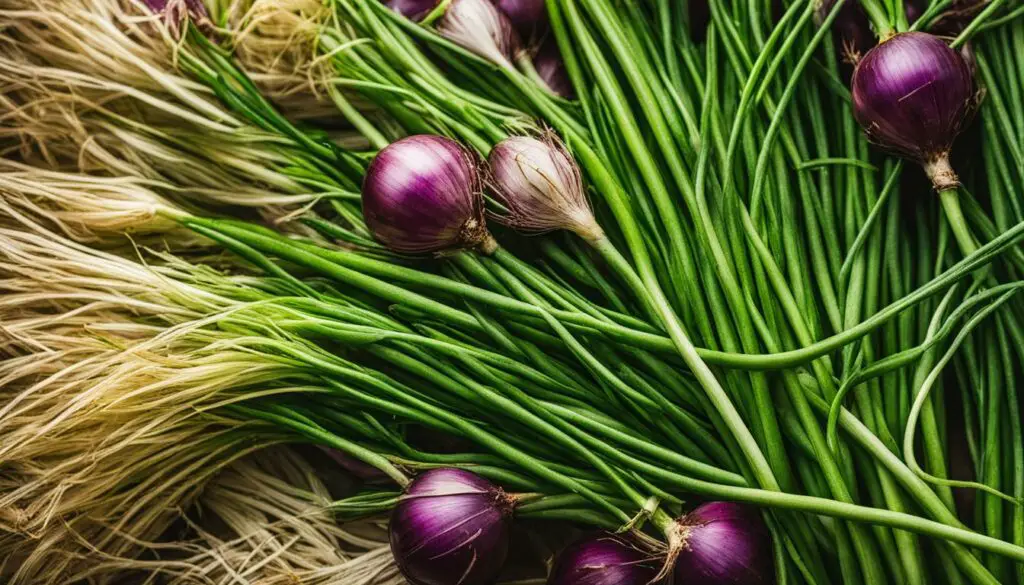
| Signs of Onion Poisoning in Cats | Treatment |
|---|---|
|
|
The Lactose Intolerance in Cats
Just like some humans, cats can also be lactose intolerant. This means that their bodies have difficulty digesting lactose, the sugar found in milk and dairy products. Feeding cats milk or cheese can result in digestive upset, including diarrhea and stomach discomfort.
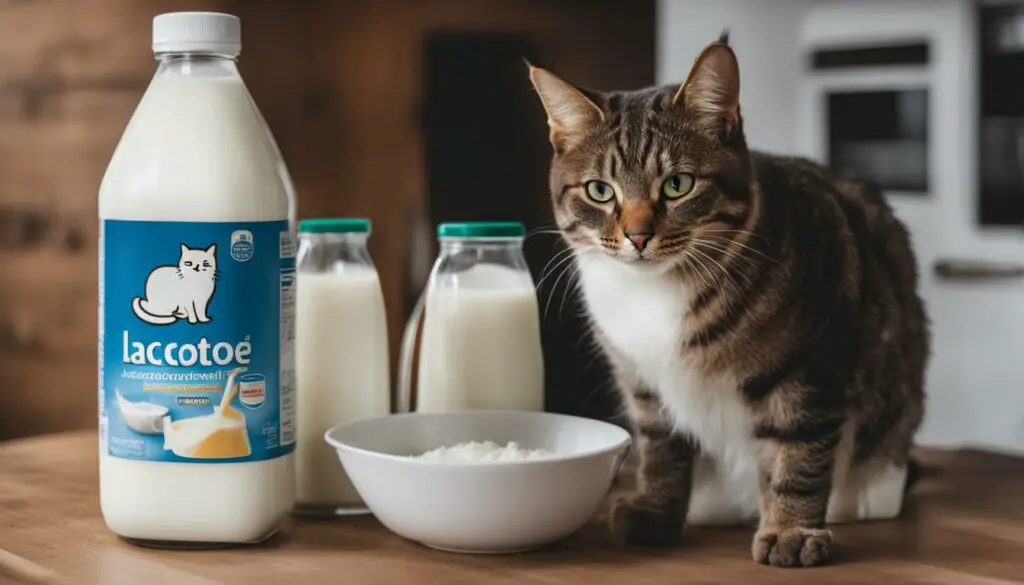
It is important to note that lactose intolerance is a common condition among cats, and it is not recommended to give them any dairy products. While cats may be attracted to the smell and taste of milk, it is best to avoid giving them this treat to prevent any discomfort or health issues.
If you’re looking for alternative options to treat your cat, there are many cat-friendly snacks available on the market that are specifically formulated to meet their nutritional needs. These treats are often made with ingredients that are safe and easily digestible for cats, ensuring they can enjoy a tasty snack without any adverse effects.
Can Cats Eat Cheese?
Cheese is another dairy product that should be avoided when it comes to feeding cats. While some cats may enjoy the taste of cheese, it can still cause digestive upset due to the lactose content. It’s best to err on the side of caution and refrain from giving cats any cheese, even in small quantities.
| Can Cats Drink Milk? | Can Cats Eat Cheese? |
|---|---|
| No, cats are lactose intolerant and may experience digestive upset if given milk. | No, cheese also contains lactose and can cause digestive issues in cats. |
| It is recommended to provide cats with fresh water for hydration instead. | Opt for cat-friendly treats that are specially made for their dietary needs. |
If you’re unsure about what treats are safe for your cat, consult with your veterinarian. They can provide guidance on the best dietary options for your cat’s specific needs and ensure they receive proper nutrition without any risk of digestive discomfort.
The Dangers of Alcohol for Cats
As a responsible cat owner, it is important to be aware of the dangers of alcohol consumption for cats. Alcohol, including beer, liquor, and wine, can have severe and potentially fatal effects on our feline friends. Cats are much smaller than humans and their bodies are not equipped to metabolize alcohol efficiently. Even a small amount of alcohol can lead to alcohol poisoning, which can cause serious damage to a cat’s liver and brain.
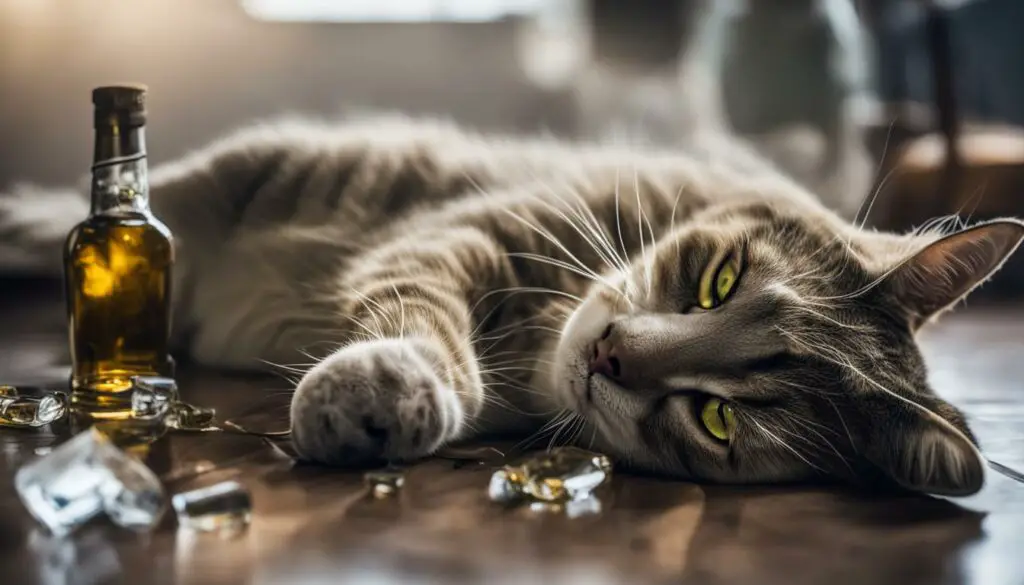
Common symptoms of alcohol poisoning in cats include disorientation, vomiting, difficulty breathing, seizures, and even coma. It is crucial to keep all alcoholic beverages out of reach of cats to prevent accidental ingestion. Additionally, never attempt to give alcohol to a cat as a means of calming them down or for any other reason. Alcohol is toxic to cats and has no therapeutic benefits for them.
The Dangers of Alcohol for Cats – Key Points:
- Cats’ bodies are not equipped to metabolize alcohol efficiently.
- Even a small amount of alcohol can cause alcohol poisoning in cats.
- Alcohol can lead to severe liver and brain damage in cats.
- Symptoms of alcohol poisoning in cats include disorientation, vomiting, difficulty breathing, seizures, and coma.
- Keep all alcoholic beverages out of reach of cats to prevent accidental ingestion.
By understanding the dangers of alcohol for cats and taking preventative measures, we can ensure the safety and well-being of our beloved feline companions. If you suspect that your cat has ingested alcohol or is showing symptoms of alcohol poisoning, it is crucial to seek immediate veterinary care. Remember, when it comes to alcohol and cats, the best policy is to keep them completely separate.
The Risks of Grapes and Raisins for Cats
Grapes and raisins may seem like harmless snacks for humans, but they can be highly toxic to cats. Even small quantities of grapes or raisins can cause kidney failure in cats, leading to serious health complications. It is important to understand the risks associated with these foods and ensure that your feline friend is kept safe from them.
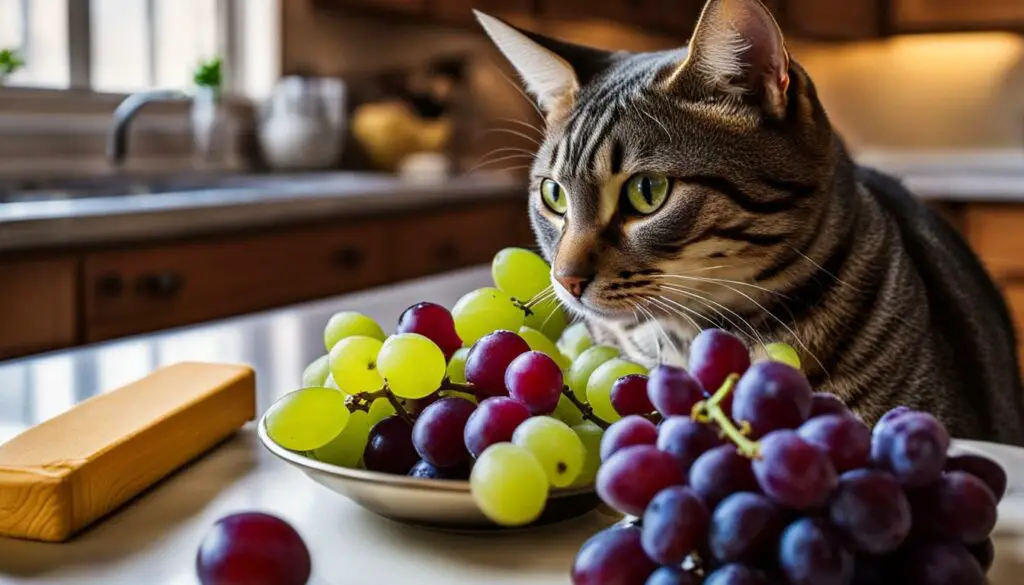
The exact substance in grapes and raisins that causes toxicity in cats is still unknown, making it difficult to determine the exact threshold at which these fruits become dangerous. Some cats may show signs of illness immediately after consuming grapes or raisins, while others may not exhibit symptoms until several hours or even days later. Common symptoms of grape or raisin ingestion in cats include vomiting, diarrhea, loss of appetite, and increased thirst and urination.
To prevent any potential renal issues, it is best to avoid giving your cat any grapes or raisins. This includes not leaving them in easily accessible areas, such as on countertops or dining tables. It is also important to be cautious when sharing foods with your cat or allowing them to scavenge for leftovers, as grapes and raisins can sometimes be hidden in dishes or baked goods.
The Risks of Grapes and Raisins for Cats:
- Grapes and raisins can cause kidney failure in cats
- Even small quantities can be toxic
- Symptoms may not appear immediately
- Avoid sharing foods containing grapes or raisins with your cat
Remember, prevention is key when it comes to protecting your cat’s health. By being aware of the risks associated with grapes and raisins and taking necessary precautions, you can help ensure that your furry friend stays happy and healthy.
The Dangers of Caffeine for Cats
Caffeine is highly toxic to cats and can have severe consequences if ingested. As a cat owner, it is crucial to be aware of the harmful effects of caffeine and ensure that your feline friend does not have access to any caffeine-containing substances.
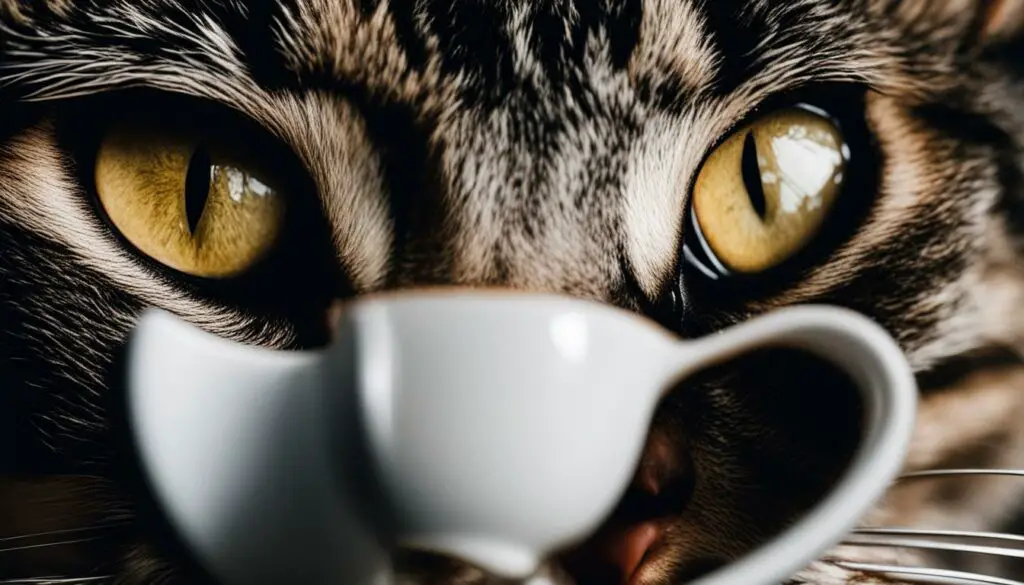
Cats are much more sensitive to the effects of caffeine compared to humans. Even small amounts of caffeine can cause restlessness, rapid breathing, heart palpitations, and muscle tremors in cats. In severe cases, it can even lead to coma or death. It’s important to remember that cats cannot metabolize caffeine as efficiently as humans can, making them more susceptible to its toxic effects.
The Symptoms of Caffeine Poisoning in Cats:
- Restlessness and hyperactivity
- Rapid breathing and heart rate
- Increased blood pressure
- Vomiting and diarrhea
- Abnormal heart rhythms
- Muscle tremors and seizures
To keep your cat safe, it is essential to keep all caffeine-containing substances out of their reach. This includes coffee, tea, cocoa, energy drinks, and colas. Be aware that products like chocolate also contain caffeine, so it’s vital to prevent your cat from accessing any food or beverages that contain chocolate as well.
Remember, the best diet for your cat consists of high-quality cat food that meets their specific nutritional needs. Consult with your veterinarian to ensure you are providing your cat with a balanced and healthy diet. By being mindful of the dangers of caffeine and other toxic foods, you can help keep your furry friend safe and healthy.
The Toxicity of Chocolate for Cats
When it comes to our furry feline friends, it’s essential to be aware of the potential dangers lurking in our everyday foods. One such food item that cat owners should be particularly cautious about is chocolate. While chocolate may be a delectable treat for humans, it can be highly toxic to cats due to the presence of theobromine.
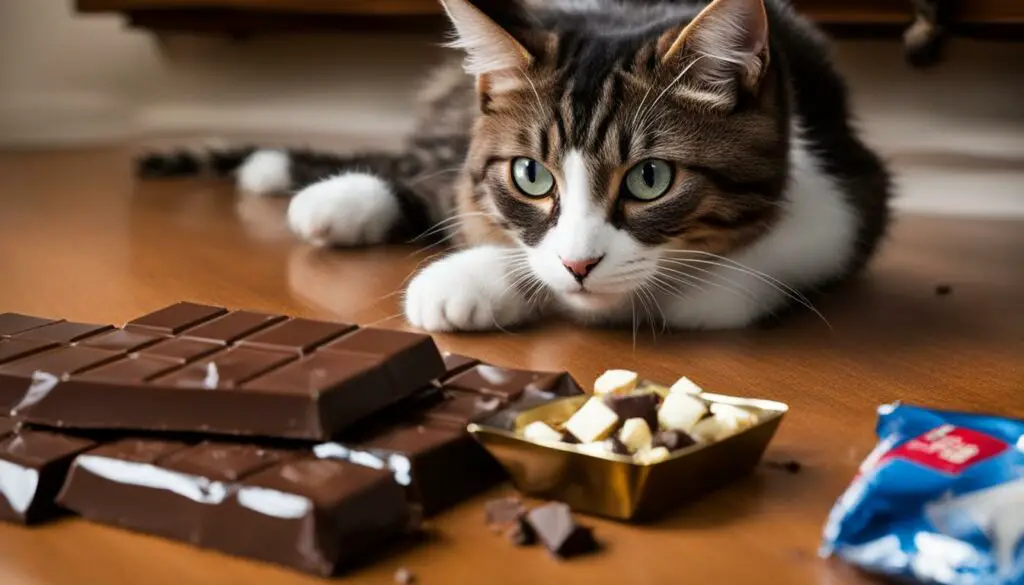
Dark chocolate and unsweetened baking chocolate are particularly dangerous for cats. Ingesting even small amounts of chocolate can result in abnormal heart rhythms, tremors, seizures, and even death. Immediate veterinary attention is crucial if you suspect your cat has consumed any chocolate.
To prevent any chocolate poisoning incidents, it is crucial to keep all chocolate products out of reach of cats. Make sure to store them in secure containers and away from curious paws. Educating family members and visitors about the dangers of chocolate for cats can also help prevent accidental ingestion.
Table: Foods to Avoid Feeding Cats
| Food | Dangers |
|---|---|
| Chocolate | Poisonous to cats, can cause abnormal heart rhythms, tremors, seizures, and death. |
| Onions, Garlic, and Chives | Can cause anemia by breaking down red blood cells in cats. |
| Alcohol | Highly toxic to cats, can cause liver and brain damage. |
| Grapes and Raisins | Can cause kidney failure in cats even in small quantities. |
Remember, cats have unique dietary needs, and it’s crucial to provide them with a balanced and nutritious diet that fulfills their specific requirements. Consult with your veterinarian to ensure your cat’s diet is appropriate and safe for their overall well-being.
The Dangers of Bones and Fatty Meat for Cats
When it comes to feeding your furry feline friend, it’s essential to be aware of the potential dangers posed by certain foods. In particular, bones and fatty meat can pose significant risks to cats and should be avoided in their diet. Let’s take a closer look at why these foods can be harmful.
Firstly, fatty meat, whether it’s cooked or uncooked, can cause digestive upset in cats. Consuming excessive fat can lead to vomiting and diarrhea, which can be uncomfortable and distressing for your cat. It’s important to stick to lean protein sources that provide the necessary nutrients without the added fat.
Secondly, bones can be hazardous for cats. Cooked bones, in particular, can splinter and cause choking or internal injuries when ingested. This is why it’s crucial to ensure that your cat doesn’t have access to bones or any bone-in meat. Stick to boneless options to keep your feline friend safe.
Overall, it’s best to steer clear of bones and fatty meat when feeding your cat. Instead, opt for lean protein sources that are safe and provide the necessary nutrition. Always consult with your veterinarian to determine the best diet plan for your cat’s specific needs and ensure their overall health and well-being.
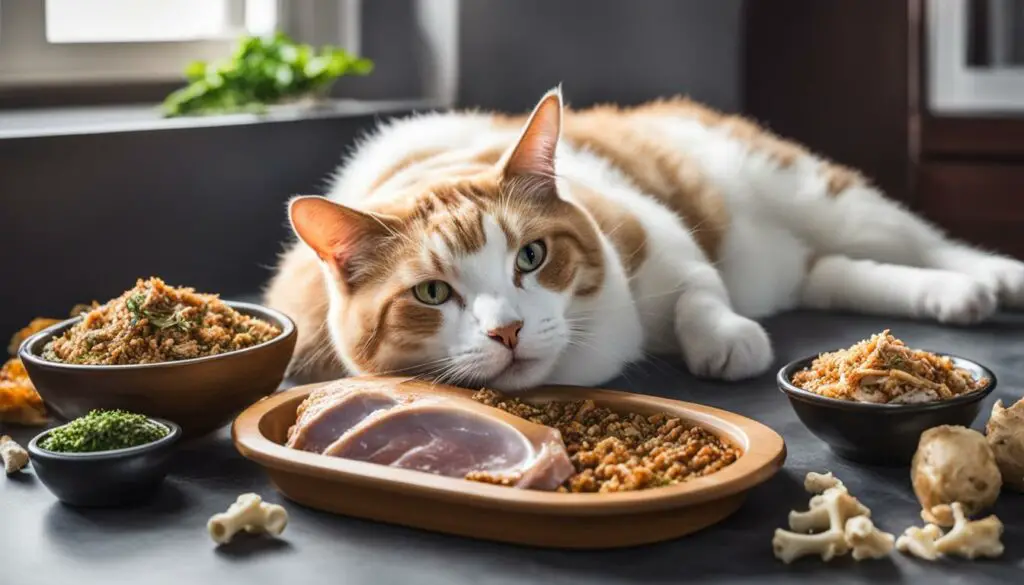
The Risks of Raw Eggs and Raw Fish for Cats
Feeding cats raw eggs and raw fish may seem like a natural and healthy choice. However, there are significant risks associated with these food choices that cat owners need to be aware of. Raw eggs can potentially contain harmful bacteria such as Salmonella, which can cause food poisoning in cats. Similarly, raw fish can contain bacteria that can lead to digestive upset and other health issues.
It is important to note that raw eggs can also have an adverse effect on a cat’s overall health. Raw egg whites contain avidin, which can interfere with biotin absorption, leading to a biotin deficiency in cats. Biotin is an essential nutrient that plays a crucial role in maintaining healthy skin, coat, and overall metabolic function.
When it comes to raw fish, there is another concern to consider. Raw fish, especially certain varieties like tuna and salmon, contain an enzyme called thiaminase. This enzyme breaks down thiamine, a vital B vitamin, which can lead to thiamine deficiency in cats. Thiamine deficiency can cause neurological issues, including loss of appetite, seizures, and in severe cases, can be fatal.
The Risks of Feeding Cats Raw Eggs and Raw Fish:
- Raw eggs can contain harmful bacteria like Salmonella, leading to food poisoning.
- Raw egg whites contain avidin, which can interfere with biotin absorption.
- Raw fish, especially certain varieties, contain thiaminase, which breaks down thiamine and can lead to thiamine deficiency.
- Thiamine deficiency can cause neurological issues and, in severe cases, can be fatal.
Considering these risks, it is best to avoid feeding cats raw eggs and raw fish. If you are looking to provide your cat with a protein-rich diet, consult with your veterinarian for appropriate alternatives and suitable cat food options. Providing a balanced and nutritionally complete diet is essential for your cat’s overall health and well-being.
| Risks of Feeding Cats Raw Eggs | Risks of Feeding Cats Raw Fish |
|---|---|
| 1. Raw eggs can contain harmful bacteria like Salmonella, leading to food poisoning in cats. | 1. Raw fish, especially certain varieties like tuna and salmon, contain the enzyme thiaminase, which breaks down thiamine. |
| 2. Raw egg whites contain avidin, which can interfere with biotin absorption in cats. | 2. Thiamine deficiency caused by the breakdown of thiamine by thiaminase can lead to neurological issues in cats. |
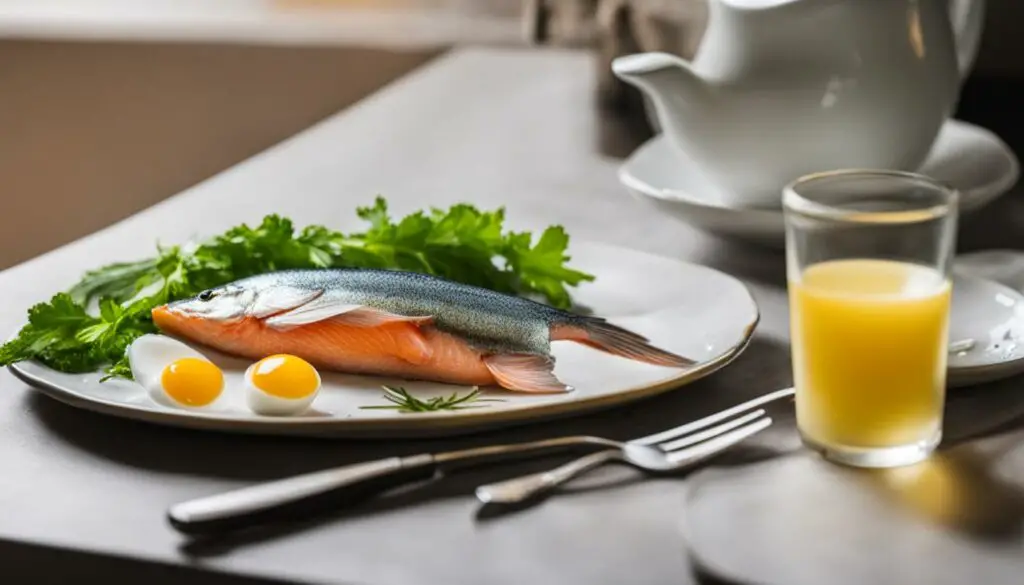
The Importance of Cat-Specific Diets
When it comes to the dietary needs of our feline friends, it’s crucial to understand that they have unique requirements that differ from those of dogs. While an occasional nibble of dog food may not harm a cat, feeding them a steady diet of dog food can lead to nutritional deficiencies and health issues. Cats are obligate carnivores, which means they require a diet that is high in animal-based protein.
One of the key differences between cat food and dog food is the protein content. Cats need a higher percentage of protein in their diet to support their muscle mass, organ function, and overall health. Additionally, cats have specific requirements for essential nutrients such as taurine, arachidonic acid, and vitamin A, which may not be adequately met by dog food alone.
Proper cat nutrition also involves considering their unique digestive system. Cats have a shorter digestive tract compared to dogs, which affects their ability to break down and absorb nutrients efficiently. Feeding cats a diet that is specifically formulated for their digestive system can help prevent digestive issues and ensure optimal nutrient absorption.
| Cat Food | Dog Food | |
|---|---|---|
| Protein Content | Higher percentage of animal-based protein | Lower percentage of animal-based protein |
| Taurine | Essential nutrient for heart health | Not as critical for dogs |
| Arachidonic Acid | Essential fatty acid for overall health | Not as critical for dogs |
| Vitamin A | Essential for vision and immune function | Not as critical for dogs |
It’s important to choose cat-specific diets that meet these nutritional requirements. Look for cat food that is labeled as “complete and balanced” or has undergone feeding trials to ensure it meets the necessary standards. Consulting with a veterinarian can also provide guidance on selecting the right cat food and addressing any specific dietary concerns or health conditions your cat may have.
By providing your cat with a diet tailored to their specific needs, you can ensure they receive the proper nutrition for optimal health and well-being. So when it comes to cat food vs. dog food, remember that cats require cat-specific diets to thrive.
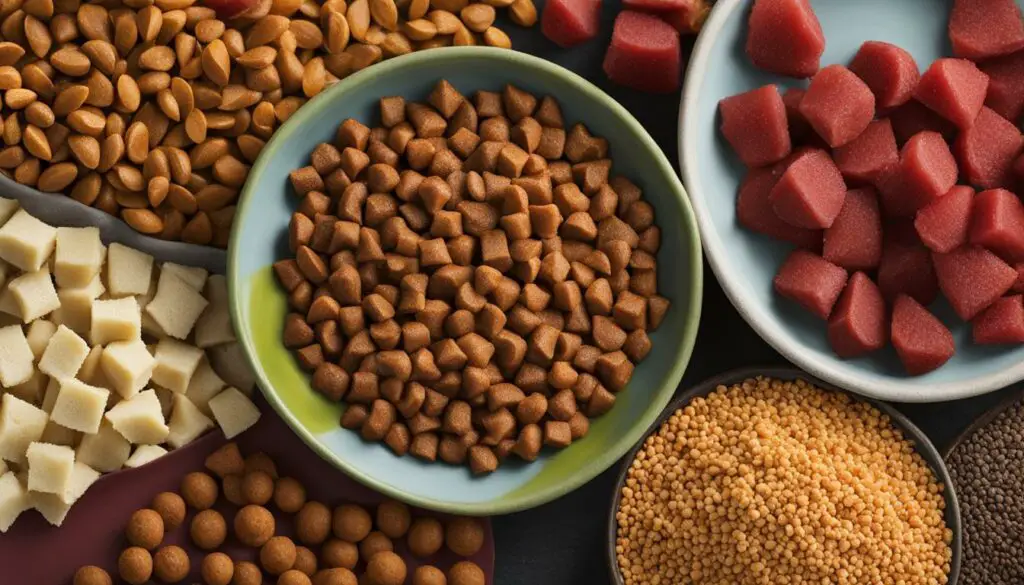
The Dangers of Excessive Feeding and Bread Dough
Feeding our feline friends is an important responsibility as pet owners, but it’s crucial to strike the right balance. Overfeeding cats can lead to a host of health issues, including obesity and diabetes. It’s important to keep their portion sizes in check and ensure they maintain a healthy weight.
Another common danger is bread dough. While it may be tempting to share a piece of dough with your cat, it’s best to avoid it altogether. When ingested, the dough can expand in their stomachs, causing severe pain, discomfort, and even potential blockages. It’s essential to keep bread dough out of their reach and opt for cat-friendly treats instead.
Remember, as cat owners, it’s our responsibility to provide our furry friends with a balanced diet and protect them from potential dangers like overfeeding and inappropriate foods. By doing so, we can ensure their overall well-being and happiness.
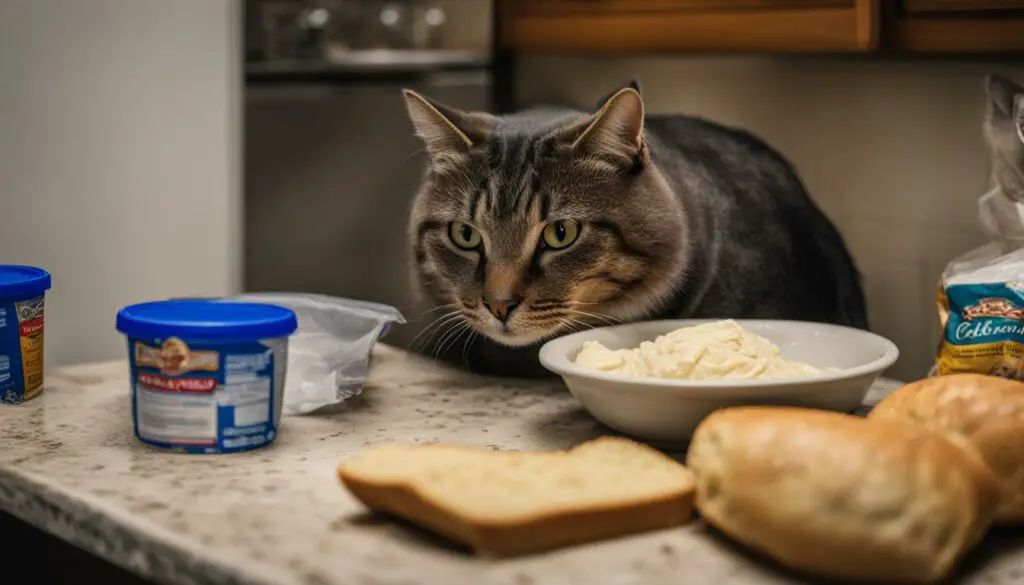
The Dangers of Overfeeding Cats
Overfeeding cats has become a common issue leading to various health problems. Obesity is a significant concern, as it can lead to a range of issues from joint pain to heart disease. It’s important to monitor your cat’s feeding portions and consult with your veterinarian to determine the appropriate amount of food they need based on their weight, age, and activity level.
Additionally, feeding cats calorie-dense treats in excess can contribute to weight gain. Opt for healthier options like interactive toys or low-calorie treats to keep them entertained without overindulging. Remember, a healthy weight is key to your cat’s overall well-being and longevity.
| Dangers of Overfeeding Cats | Prevention Tips |
|---|---|
| Obesity | Monitor portion sizes and avoid free-feeding |
| Joint Pain and Arthritis | Encourage exercise and provide joint-supportive supplements |
| Diabetes | Feed a balanced diet and avoid excessive carbohydrates |
| Heart Disease | Ensure a low-sodium diet and regular veterinary check-ups |
“Maintaining a healthy weight through proper portion control and a balanced diet is essential for your cat’s overall health and longevity.” – Dr. Emily Thompson, DVM
The Dangers of Bread Dough
While bread dough may seem harmless, it can pose significant risks to your cat’s health. As the dough rises in their stomach, it can cause bloating, discomfort, and even life-threatening complications. The yeast in the dough ferments, producing alcohol which can lead to alcohol poisoning in cats.
To prevent any potential harm, it’s crucial to keep bread dough out of reach. Make sure to discard any leftover dough properly and secure it in a closed container. If you suspect your cat has ingested bread dough, seek immediate veterinary attention to avoid any complications.
Conclusion
In summary, while it may be tempting to feed your cat tuna every day, it is not recommended as it can lead to various health risks. Tuna alone does not provide a balanced diet for cats and can result in malnutrition and mercury poisoning. It is crucial to limit the consumption of tuna and ensure it is only given as an occasional treat.
Instead, it is important to provide your cat with a diet that meets their specific nutritional needs. Consult with a veterinarian to determine the best diet plan for your cat, which should consist of animal-based protein, essential fatty acids, vitamins, minerals, and other nutrients. There are many healthy cat food options available that can fulfill their dietary requirements.
Furthermore, it is crucial to be aware of other foods that can be harmful to cats. Onions, garlic, chives, alcohol, caffeine, grapes, raisins, chocolate, bones, raw eggs, raw fish, and bread dough should all be avoided as they can cause a range of health issues and even be fatal to cats.
Always prioritize your cat’s well-being by providing them with a cat-specific diet and avoiding the consumption of potentially harmful foods mentioned in this article. By doing so, you can ensure that your feline friend remains healthy and happy for years to come.
FAQ
Can I feed my cat tuna everyday?
While cats may be addicted to tuna and find it difficult to resist, it is not recommended to feed them tuna every day. Tuna alone does not provide a balanced diet for cats and can lead to malnutrition and mercury poisoning if consumed in excess. It is best to consult with a veterinarian to determine the best diet plan for your cat.
What are the risks of feeding cats tuna?
Feeding cats tuna as a regular meal can lead to weight gain, nutritional deficiencies, and mercury poisoning. Tuna lacks the necessary nutrients for a cat’s overall health and can be harmful if consumed in excess. It is important to limit the consumption of tuna and ensure it is only given as an occasional treat.
What is the best diet for cats?
Cats require a diet that is rich in animal-based protein and low in carbohydrates. A balanced cat diet consists of essential fatty acids, vitamins, minerals, and other nutrients that fulfill their specific nutritional needs. It is recommended to consult with a veterinarian to determine the best diet plan for your cat and explore healthy cat food options.
Can cats eat onions, garlic, and chives?
No, onions, garlic, and chives are toxic to cats and should never be included in their diet. These foods can break down a cat’s red blood cells, leading to anemia. Even small quantities can cause major health problems. It is important to keep all forms of onions, garlic, and chives away from cats.
Can cats drink milk or eat cheese?
Most cats are lactose intolerant, meaning their digestive systems cannot process dairy foods. Feeding cats milk or cheese can result in digestive upset, including diarrhea. It is best to avoid giving cats any dairy products to prevent any discomfort or health issues.
Can cats drink alcohol?
No, alcohol is extremely harmful to cats. Even small amounts can have severe effects on a cat’s liver and brain, leading to coma or death. It is crucial to keep all alcoholic beverages away from cats to ensure their safety.
Can cats eat grapes and raisins?
No, grapes and raisins can cause kidney failure in cats, even in small quantities. Some cats may show signs of illness after consuming grapes. To prevent any renal issues, it is best to avoid giving cats any grapes or raisins.
Can cats have caffeine?
No, caffeine is highly toxic to cats and can be fatal in large quantities. Symptoms of caffeine poisoning in cats include restlessness, rapid breathing, heart palpitations, and muscle tremors. It is essential to keep all caffeine-containing substances away from cats.
Can cats eat chocolate?
No, chocolate is toxic to cats due to the presence of theobromine. Ingesting chocolate can cause abnormal heart rhythms, tremors, seizures, and even death in cats. It is crucial to keep all chocolate products out of reach of cats.
Can cats eat bones or fatty meat?
No, bones and fatty meat can pose significant dangers to cats. Cooked and uncooked fat can cause digestive upset, including vomiting and diarrhea. Bones can cause choking or severe internal injuries. It is important to ensure that cats do not have access to bones or fatty meat.
Can cats eat raw eggs or raw fish?
No, raw eggs and raw fish can both contain bacteria that cause food poisoning in cats. Raw fish also destroys thiamine, a vital B vitamin for cats, which can result in serious neurological problems. It is best to only feed cats cooked eggs and properly cooked fish.
Can cats eat dog food?
While an occasional bite of dog food may not harm a cat, a steady diet of dog food is not suitable for cats. Cats have different nutritional requirements than dogs and need higher protein levels and specific vitamins and fatty acids. It is essential to provide cats with cat-specific diets for optimal health.
What are the risks of overfeeding cats?
Overfeeding cats can lead to obesity and related health conditions, such as diabetes. Additionally, bread dough can expand in a cat’s stomach, causing severe pain and potential blockages. It is important to monitor your cat’s feeding portions and avoid giving them bread dough.
Source Links
- https://www.petassure.com/maxscorner/cats-&-tuna-is-it-safe-to-eat/
- https://www.webmd.com/pets/cats/ss/slideshow-foods-your-cat-should-never-eat
- https://www.thesprucepets.com/tuna-for-your-cat-4800732

